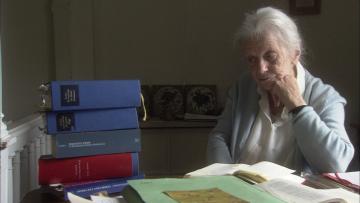Tuesday, July 30, 2024 - 12:29am
'Woman With Five Elephants' translates into a fine documentary
The woman is 85-year-old Svetlana Geier. Her five elephants include a juvenile, an idiot, a killer, some brothers and demons.
"The Woman With the Five Elephants" is a remarkable documentary portrait of the world's greatest Dostoyevsky translator, whose sharp mind, piercing blue eyes and astonishing life will captivate you.
Ukrainian-born Geier's gift for languages was her only "dowry," she says, and became her greatest survival skill under the Nazis in World War II, when Ukraine was horribly caught between two monsters, Hitler and Stalin, and their multiple atrocity-filled invasions. Marked for death as a collaborator by the Soviets, she retreated with the Wehrmacht and spent the rest of her life in Germany, working on definitive translations of Dostoyevsky's novels -- five fat pachyderms, indeed: "Crime and Punishment," "The Idiot," "The Devils," "A Raw Youth" and "The Brothers Karamazov."
How rare and wonderful for a movie's main "action" to be intellectual. This film's most memorable moments consist of watching the lady pursue her meticulous work, softly sparring with her faithful German grammarian-companion Herr Kodt in search of the precise word. ("I'll mark it and look at it later," she says after one dispute. "Meanwhile, at least use the conjunctive!" he begs.)
A text is like a piece of fabric, whose form one must help to retrieve. "Text and textile have the same root," she adds, with just the hint of a smile. Semantic subtleties -- like the different shades of white in "Moby Dick" and Dostoyevsky's comparison of fresh white snow with fresh white linen -- are what she lives for. "Unglaublich!" (incredible), she whispers.
It's no mean feat, when the syntactic "forms" of Russian and German are so diametrically opposite. "German and Russian are not compatible," Ms. Geier laments. The words zhuk zhuzhal mean "the beetle hummed" in Russian. Forget about capturing that lovely onomatopoetic sound auf Deutsch. But you've never heard anyone make German sound so beautiful as Ms. Geier when she speaks it.
Director Vadim Jendreyko lets her speech and her soulful silences go as long as they need to, especially during the train trip back to Ukraine for her first visit in 65 years. It's a deeply poignant moment, in the wintry cemetery where her parents are buried, with the beautiful, unruly wisps of Svetlana's white hair blowing in the wind.
But she and we always return to her elephants. Much cross-lingual mischief has been made just trying to get their titles right. For example: The Russian word for idiot is "idiot." Simple enough to translate, huh? But should the English title be "The" or "An" Idiot? We'll never know for sure, because Russian has no definite or indefinite articles.
"Crime and Punishment" and "Brothers Karamazov" have convenient literal translations. But the two lesser-known elephants do not: What the hell is "The Devils"?, I kept wondering during Ms. Geier's discussion of it. Turns out, it's the novel we know as "The Possessed." "Devils" is just a bad German rendering of "Demons" -- the actual title word Dostoyevsky chose to describe left-wing utopians in the political chaos of 19th-century Imperial Russia.
"The Raw Youth"? Its one-word Russian title (Podrostok) means "Adolescent" or "Juvenile" -- to describe the 19-year-old hero Arkady Dolgoruky, a nihilist rebel with the dubious cause of becoming a rich Rothschild.
This 93-minute beauty of a film is a celebration of a luminous scholar's unsung, difficult and very fine art of translation. Why do people translate? It's about the investigation into human communication and meaning, she says. "It's a yearning to find the essential -- a yearning for something that keeps escaping."
Vote:






